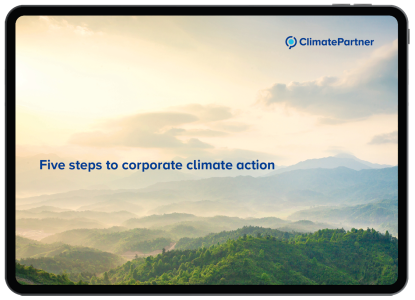ClimatePartner certified.
A new level in climate action.

ClimatePartner certification affirms that a company has worked through all five steps of a climate action strategy.
Five steps to climate action with ClimatePartner certified
We all want to do something about climate change. But what?
ClimatePartner has been supporting companies in their climate action for almost 20 years. With ClimatePartner certified, we give you a clear plan to follow, broken down into five steps.
Ready to make a difference?
Find out more about the five steps of corporate climate action in our free downloadable checklist.
Companies can do their part to limit global warming by committing to wide-reaching emissions reduction.
The checklist will guide your company through an effective and transparent climate action strategy.

Please fill out the form, you will receive the checklist by email.
Companies ensure transparency by communicating their climate action via an individual climate-ID page. Consumers can use this page to understand the steps a company is taking, including the reduction measures implemented and climate projects financed.
The ClimatePartner certified label is awarded to companies and products that commit to continuous climate action across all five steps. The label includes a unique link to the climate-ID page.
The ClimatePartner certification is the next step in ClimatePartner’s long history of empowering companies to take climate action. Find out more about why now is the time to take climate action to a new level.
Blog article: Why did we introduce the solution ClimatePartner certified?
In our blog article you learn why we introduced ClimatePartner certified, why the five steps are so important, and why you as a company should opt for ClimatePartner certified.
[unsichtbarer anchor]





